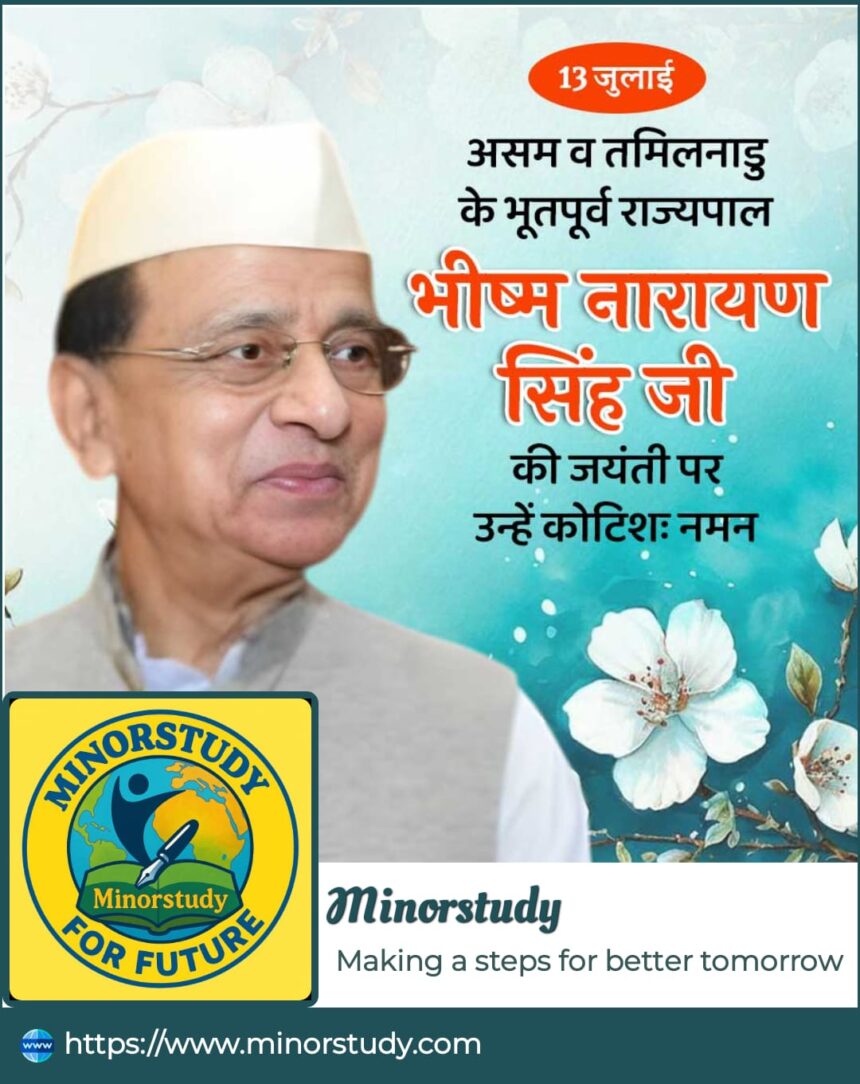7 Underrated Truths about Bhishma Narayan Singh – The Silent Force Behind India’s Democratic Strength
Bhishma Narayan Singh: India’s post-independence political fabric was not just shaped by charismatic prime ministers or fiery parliamentarians. It was also held together by committed, quiet, and principled leaders who worked tirelessly behind the scenes. Shri Bhishma Narayan Singh Ji was one such figure — a politician of rare dignity, discipline, and selfless service. Though not always in the limelight, his legacy remains deeply significant in India’s democratic and federal structure.
- 📜 History of Mr. Bhishma Narayan Singh
- 📌 Important Facts about Bhishma Narayan Singh
- 📅 Timeline of Key Events in Bhishma Narayan Singh’s Life
- ⭐ 7 Underrated Truths About Bhishma Narayan Singh Ji Contribution
- 1. Master of Silent Diplomacy
- 2. Defender of Constitutional Morality
- 3. Advocate of Regional Empowerment
- 4. Architect of Parliamentary Ethics
- 5. Bridge Between Cultures
- 6. Mentor to Many Young Leaders
- 7. Lifetime Commitment to Education and Simplicity
- 🙋 Frequently Asked Questions (FAQs)
- 🎯 Significance of Bhishma Narayan Singh in Indian Democracy
- 🪔 Wishing and Remembering Bhishma Narayan Singh
- 🧭 Daily Life Impact of His Legacy
- 📌 Important Observances and Public Memory
- ✅ Key Points to Remember
- 🏁 Conclusion – The Silent Strength of Indian Democracy
This article offers a detailed, human-centric account of Bhishma Narayan Singh’s life — from history and facts to significance, timeline, FAQs, daily life impact, and concluding insights. His life is a lesson in duty, humility, and nationalism.
Read More Articles: https://minorstudy.com/bala-bachchan-ji/
📜 History of Mr. Bhishma Narayan Singh
Bhishma Narayan Singh Ji was born on July 13, 1933, in Bhabua, then part of Bihar (now in Kaimur district). Coming from a humble family, he showed signs of leadership and service early in life. He pursued education at Banaras Hindu University (BHU) and was deeply influenced by Gandhian values and the Indian freedom movement.
He later joined the Indian National Congress, serving at various levels in both party and government. His political philosophy was grounded in constitutional values, nationalism, and federal cooperation. Over the decades, he served as Union Minister, Governor, and a respected parliamentarian.
📌 Important Facts about Bhishma Narayan Singh
✅ Born: July 13, 1933 – Bhabua, Bihar
✅ Passed Away: August 10, 2018
✅ Political Party: Indian National Congress
✅ Governorship: Served as Governor of Assam, Tamil Nadu, and Karnataka
✅ Ministerial Role: Union Minister of State for Parliamentary Affairs
✅ Parliamentarian: Member of Lok Sabha from Bihar
✅ Core Values: Gandhian ethics, secularism, federal unity, education
✅ Known for: Administrative discipline, constitutional integrity, and low-key efficiency
📅 Timeline of Key Events in Bhishma Narayan Singh’s Life
| Year | Event |
|---|---|
| 1933 | Born in Bhabua, Bihar |
| 1950s–60s | Active in Youth Congress and public service |
| 1970 | Elected to Lok Sabha |
| 1980s | Served as Union Minister of State |
| 1991–1993 | Governor of Tamil Nadu |
| 1991 | Governor of Assam |
| 1991 | Briefly held additional charge as Governor of Karnataka |
| 2018 | Passed away on August 10, aged 85 |
⭐ 7 Underrated Truths About Bhishma Narayan Singh Ji Contribution
1. Master of Silent Diplomacy
Unlike the aggressive posturing seen in contemporary politics, Singh Ji believed in quiet negotiation and constitutional channels. Whether dealing with state conflicts or sensitive federal transitions, he de-escalated tensions through behind-the-scenes diplomacy.
2. Defender of Constitutional Morality
As Governor, he upheld the spirit of the Constitution, especially during times of political instability in Tamil Nadu and Assam. He never allowed partisan politics to influence his gubernatorial decisions — a rarity in today’s climate.
3. Advocate of Regional Empowerment
Representing a small district like Bhabua and rising to national prominence, he emphasized empowering smaller regions and decentralizing power to the grassroots — reflecting the true essence of Indian federalism.
4. Architect of Parliamentary Ethics
As Minister of State for Parliamentary Affairs, he worked tirelessly to streamline legislative processes, uphold decorum, and promote transparency in parliamentary debates.
5. Bridge Between Cultures
Bhishma Narayan Singh’s cross-state governorship gave him the opportunity to promote inter-cultural harmony. In Tamil Nadu, Karnataka, and Assam — he consistently respected local traditions while reinforcing national unity.
6. Mentor to Many Young Leaders
He was known as a mentor and guide to emerging leaders in Bihar and across India, helping them adopt ethical politics, administrative discipline, and grassroots connectivity.
7. Lifetime Commitment to Education and Simplicity
Even after leaving active politics, he supported educational causes, rural upliftment, and Gandhian simplicity — avoiding any lavish lifestyle or controversial privileges.
🙋 Frequently Asked Questions (FAQs)
Q1. What was Bhishma Narayan Singh known for?
He was known for constitutional integrity, calm governance, and promoting federalism through roles as Governor and Union Minister.
Q2. Was he associated with the freedom movement?
Though he entered politics post-Independence, he was deeply inspired by the freedom fighters, especially Mahatma Gandhi.
Q3. Which states did he serve as Governor?
He served as Governor of Assam, Tamil Nadu, and Karnataka.
Q4. Was he involved in corruption or controversies?
No. He was widely respected for his clean image, non-controversial tenure, and ethical political conduct.
Q5. When did he pass away?
He passed away on August 10, 2018, at the age of 85.
🎯 Significance of Bhishma Narayan Singh in Indian Democracy
🏛️ Strengthened the Institution of Governorship
At a time when many Governors were seen as partisan, Singh Ji restored dignity and balance to the constitutional role.🌱 Model of Simplicity in Public Life
A committed Gandhian, he rejected political extravagance, focusing instead on service, character, and humility.🗣️ Balanced Federal Voices
He helped create constructive dialogue between the Centre and States, ensuring no region felt ignored.
🪔 Wishing and Remembering Bhishma Narayan Singh
🌸 “On his birth anniversary, we remember Shri Bhishma Narayan Singh Ji — a man of principle, a lover of peace, and a true servant of the Indian Constitution. May his values continue to inspire generations.”
🧭 Daily Life Impact of His Legacy
✅ Administrative Neutrality: His example inspired several civil servants to uphold non-partisan discipline.
✅ Respect for Constitutional Offices: In times of political drama, his legacy reminds leaders of the importance of constitutional restraint.
✅ Support for Regional Inclusion: His work encouraged more youth from rural Bihar and small towns to enter mainstream politics.
✅ Educational Contributions: Post-politics, he was involved with BHU and rural educational institutions, supporting literacy in backward regions.
📌 Important Observances and Public Memory
Educational institutions in Bihar and BHU have held seminars, debates, and essay competitions in his honor.
Several state-level leaders in Bihar pay tributes every year on August 10.
Political science curricula in some universities cite his tenure as Governor as a case study in constitutional propriety.
✅ Key Points to Remember
A disciplined administrator and selfless leader.
One of India’s few Governors with multiple successful state tenures.
Always promoted national unity through cultural sensitivity and political fairness.
Advocated quiet governance, eschewing media spectacle for real work.
🏁 Conclusion – The Silent Strength of Indian Democracy
Bhishma Narayan Singh life was never about fame, power, or headlines. It was about building bridges, upholding the Constitution, and silently empowering others. In an era filled with noise, his silence was strength. In politics filled with ego, his humility was revolution. In systems marred by favoritism, his fairness was a lesson.
His contribution, though underrated in popular media, is immensely important to Indian democracy. He showed that you don’t need to be in the spotlight to make an illuminating impact.
“True leaders are not those who shine in the limelight but those who light the path for others. Bhishma Narayan Singh was such a torchbearer.”








